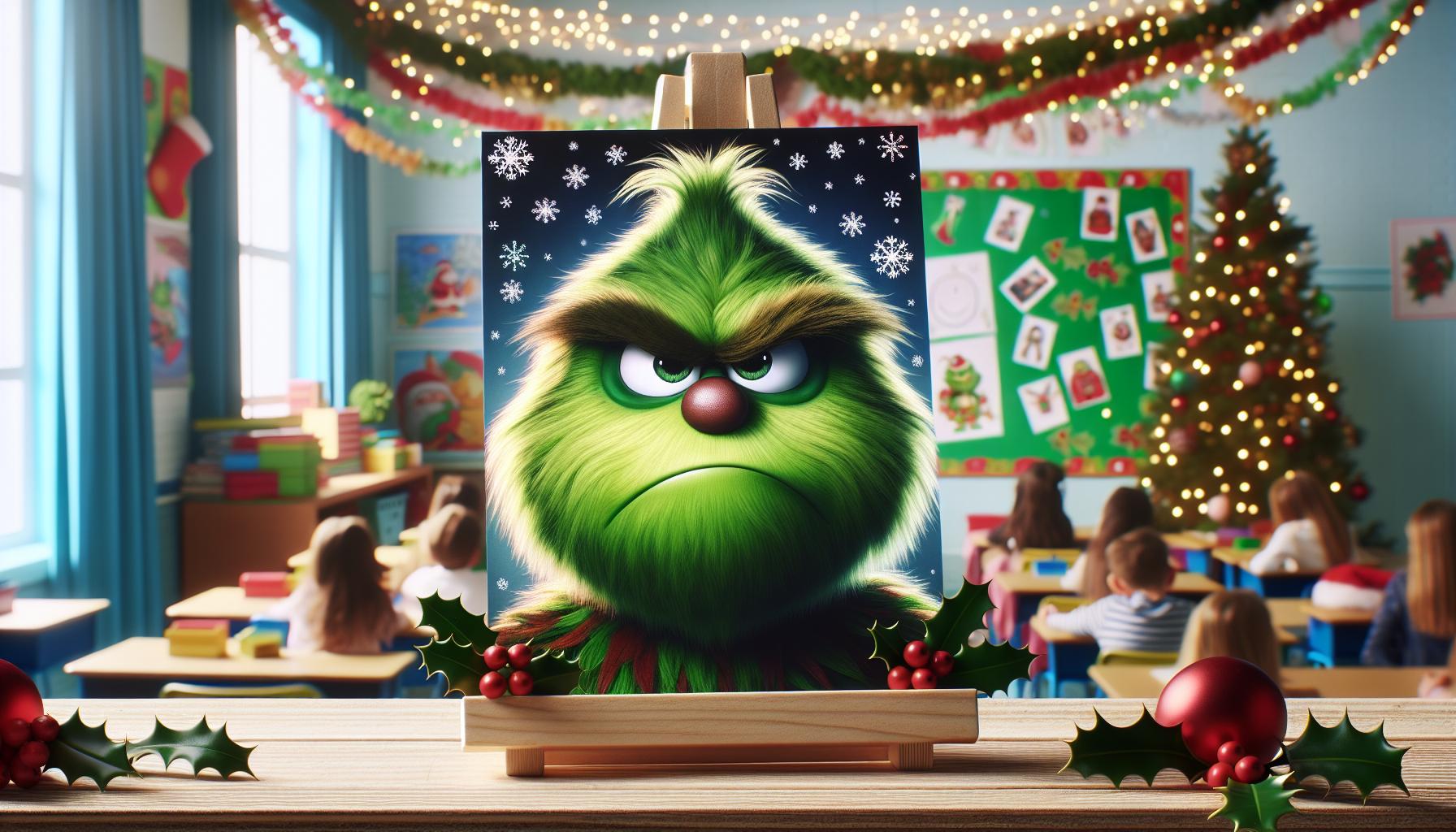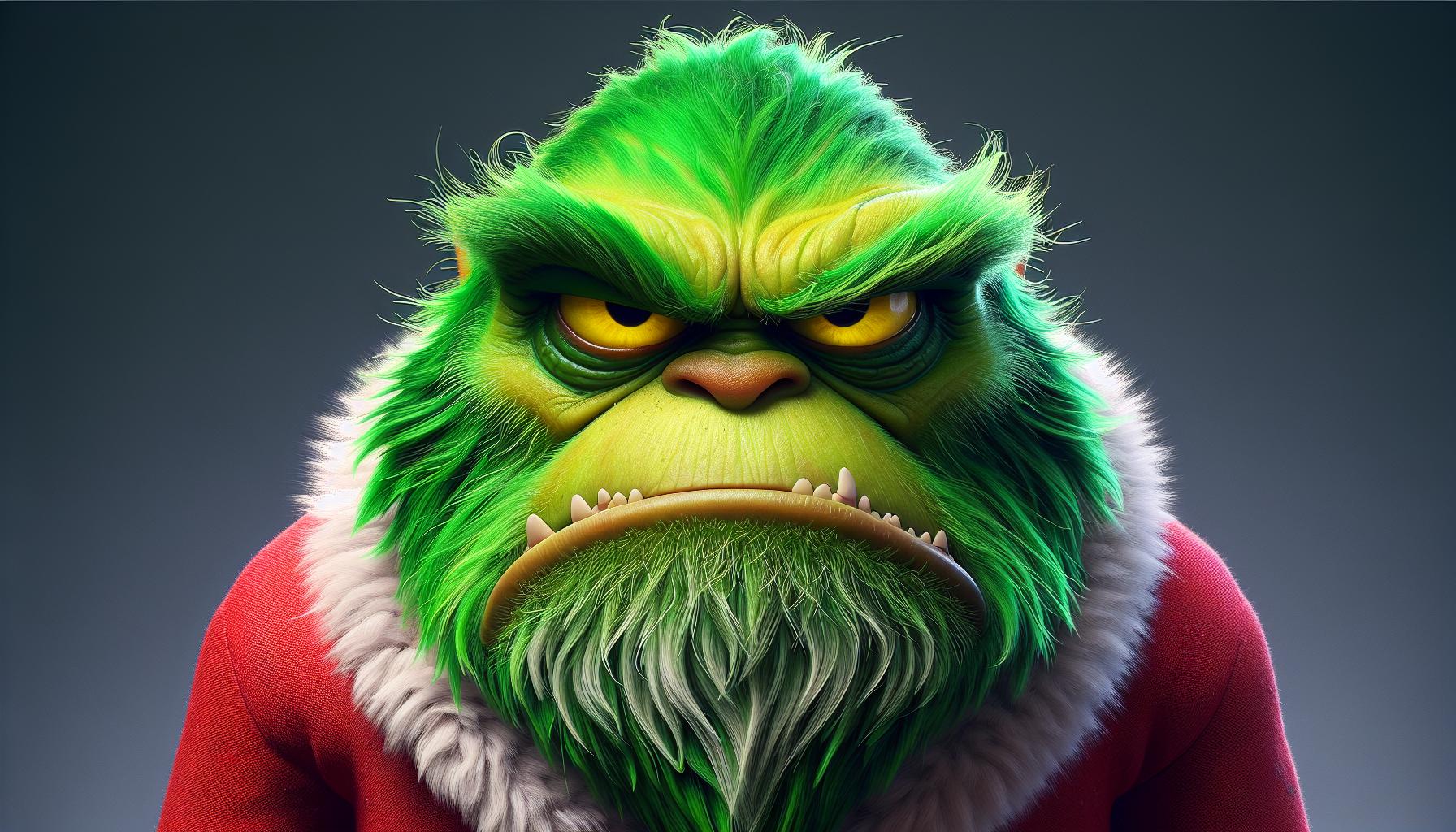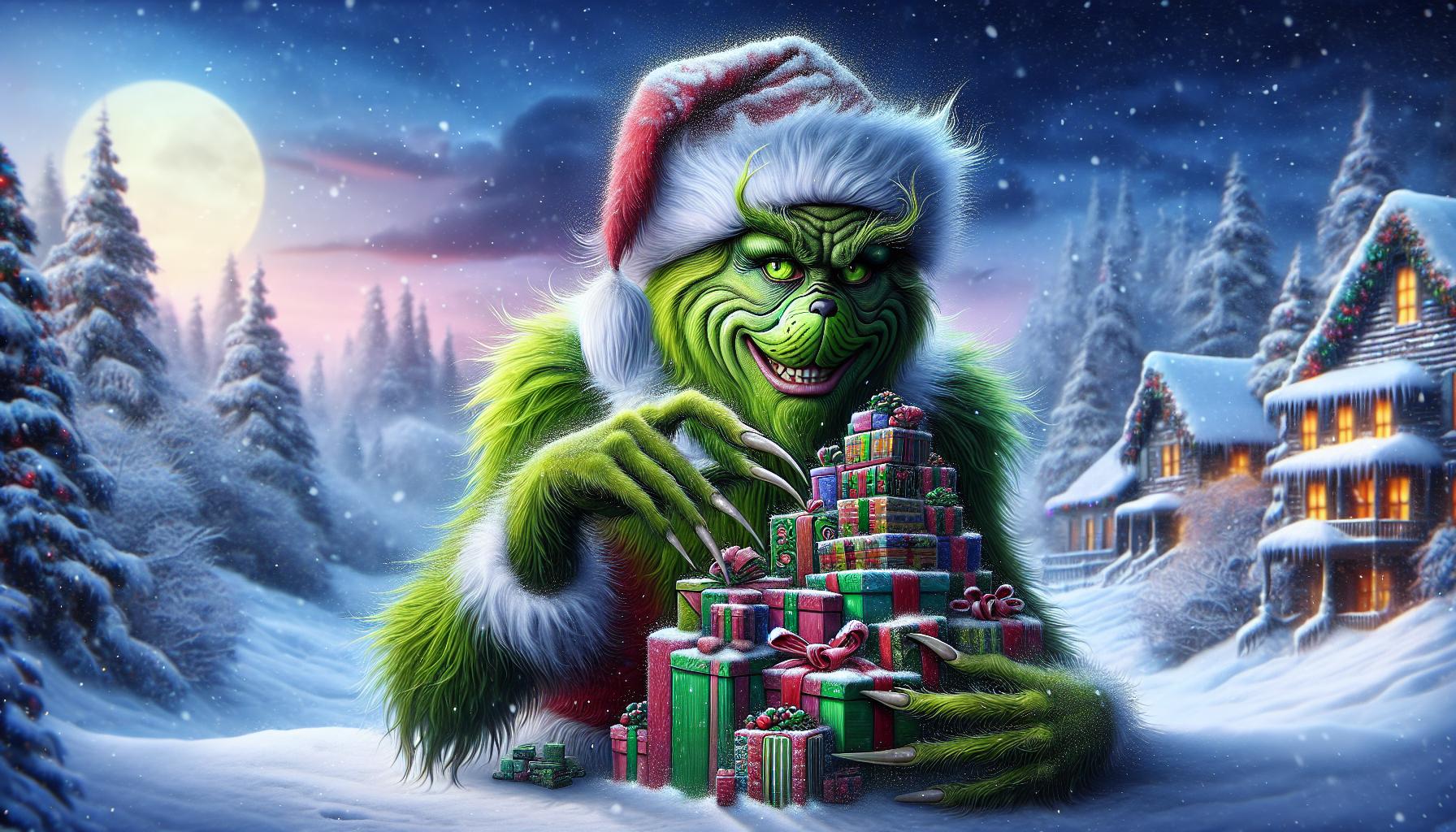I’ve always been fascinated by the iconic character of the Grinch, and I’m thrilled to explore the world of Grinch clipart with you today. This green, furry anti-hero has captured hearts and imaginations since Dr. Seuss first introduced him in 1957.
Grinch clipart has become incredibly popular, especially during the holiday season. It’s a fantastic way to add a touch of whimsy and humor to your Christmas-themed projects. Whether you’re creating greeting cards, decorations, or social media posts, Grinch clipart can bring that perfect blend of mischief and holiday cheer to your designs.
Key Takeaways
- Grinch clipart evolved from Dr. Seuss’s original 1957 illustration to popular digital designs used in holiday projects.
- The iconic Grinch design features exaggerated facial expressions, vibrant green fur, and a distinctive color palette.
- Grinch clipart is widely used in holiday cards, classroom decorations, and social media graphics.
- Using Grinch clipart requires understanding copyright laws, fair use guidelines, and proper licensing options.
- Creating original Grinch-inspired clipart involves digital tools and techniques while maintaining the character’s essence.
Clipart:2tvnqwgta7a= Grinch
The Grinch clipart we know today has a rich history rooted in Dr. Seuss’s original creation. I’ll explore how this iconic character transformed from a hand-drawn illustration to the digital clipart that’s widely used in holiday designs.
Dr. Seuss’s Original Illustration
Dr. Seuss first brought the Grinch to life in his 1957 book “How the Grinch Stole Christmas!” The original illustration featured a green, furry creature with a distinctive scowl and a heart “two sizes too small.” Seuss’s unique drawing style, characterized by whimsical lines and exaggerated features, laid the foundation for all future Grinch depictions. His hand-drawn images captured the Grinch’s grumpy demeanor and mischievous nature, setting the stage for the character’s enduring popularity.
Evolution into Digital Clipart
As technology advanced, the Grinch made its way into the digital realm. The transition to digital clipart began in the 1990s with the rise of personal computers and graphic design software. Artists and designers started recreating the Grinch’s likeness in vector formats, allowing for scalable, high-quality images. This digital evolution expanded the Grinch’s visual repertoire, introducing new poses, expressions, and holiday-themed variations. Today, Grinch clipart is available in numerous styles, from faithful recreations of Seuss’s original to modern, simplified versions tailored for easy use in digital projects.
Popular Uses of Grinch Clipart
Grinch clipart finds its way into numerous holiday-themed projects, adding a touch of whimsy and nostalgia. From personal crafts to professional designs, this iconic character’s image enhances various festive creations.
Holiday Cards and Invitations
Grinch clipart transforms ordinary holiday cards and invitations into eye-catching greetings. I’ve seen countless designs featuring the Grinch’s scowling face or his mischievous grin, perfectly capturing the character’s unique charm. These images often appear alongside witty quotes from the story, creating a delightful combination of visual appeal and humor. Digital designers and crafters alike use Grinch clipart to create personalized cards that stand out in the sea of traditional holiday greetings.
Classroom Decorations
Teachers and students embrace Grinch clipart to bring holiday cheer to educational spaces. I’ve observed classrooms adorned with Grinch-themed bulletin boards, door decorations, and reading nooks. These playful images serve as excellent visual aids for lessons on kindness, community, and the true meaning of the holidays. Grinch clipart also features prominently in classroom activities, such as coloring sheets, craft projects, and holiday-themed worksheets, engaging students in festive learning experiences.
In the digital age, Grinch clipart has found a new home on social media platforms. I’ve noticed an increasing trend of users incorporating Grinch images into their holiday-themed posts, stories, and profile pictures. Social media managers and content creators leverage Grinch clipart to design engaging graphics for brand promotions, holiday countdowns, and festive announcements. These images resonate with audiences across generations, tapping into nostalgia while remaining relevant in contemporary digital culture. The versatility of Grinch clipart makes it an ideal choice for creating shareable content that captures the spirit of the season.
Analyzing the Iconic Grinch Design
The Grinch’s design is a masterpiece of character creation, instantly recognizable and enduringly popular. I’ll examine the key elements that make this grumpy green character so iconic.
Facial Features and Expressions
The Grinch’s face is a study in expressive exaggeration. His yellow eyes, often narrowed in suspicion or contempt, dominate his visage. A prominent brow furrows deeply, conveying his perpetual state of annoyance. The Grinch’s mouth, capable of stretching into an unsettling grin, is typically depicted in a dramatic frown, with sharp teeth occasionally visible. His nose, reminiscent of a cat’s, adds to his sour expression. These exaggerated features allow artists to convey a wide range of emotions, from scheming glee to reluctant kindness, making the Grinch a versatile character in clipart designs.
Color Palette and Styling
The Grinch’s color scheme is bold and memorable. His fur is a vibrant shade of green, often with darker shading to add depth and texture. This green contrasts sharply with his red eyes, creating a visually striking appearance. The Grinch’s body is typically depicted as lean and slightly hunched, with long, nimble fingers perfect for his mischievous activities. His fur is often styled in tufts or spikes, adding to his unkempt and wild appearance. In holiday-themed clipart, the Grinch is frequently shown wearing a Santa suit, with the red fabric providing a stark and ironic contrast to his green fur and grumpy demeanor.
Legal Considerations for Using Grinch Clipart
When using Grinch clipart, it’s crucial to understand the legal implications to avoid copyright infringement. I’ll explore the key legal considerations, including copyright laws, fair use guidelines, and licensing options for Grinch-related images.
Copyright and Fair Use
Copyright laws protect the Grinch character and associated images, which are owned by Dr. Seuss Enterprises. Using Grinch clipart without permission may violate these rights. Fair use allows limited use of copyrighted material without permission for purposes such as criticism, commentary, or education. However, fair use has specific criteria:
- Purpose and character of use (commercial vs. non-profit educational)
- Nature of the copyrighted work
- Amount and substantiality of the portion used
- Effect on the potential market for the copyrighted work
Fair use is complex and determined on a case-by-case basis. For personal, non-commercial projects, using Grinch clipart may fall under fair use. Commercial use typically requires explicit permission or licensing.
Licensing Options
To legally use Grinch clipart for commercial purposes, licensing is often necessary. Several options exist:
- Official licensing: Contact Dr. Seuss Enterprises directly for official licensing agreements.
- Stock image sites: Some stock image websites offer licensed Grinch-inspired clipart.
- Creative Commons licenses: Look for Grinch-inspired artwork with permissive Creative Commons licenses.
- Public domain: Older works may be in the public domain, but this is unlikely for most Grinch-related content.
- Custom creation: Commission an artist to create original Grinch-inspired artwork, ensuring you obtain the necessary rights.
When selecting a licensing option, carefully review the terms to ensure compliance with usage restrictions and attribution requirements. Proper licensing protects your projects from legal issues while supporting the creators and rights holders of Grinch-related content.
Creating Your Own Grinch-Inspired Clipart
I’ve discovered that creating Grinch-inspired clipart is an exciting way to personalize holiday projects. With the right tools and techniques, anyone can craft unique Grinch-themed designs while maintaining the character’s essence.
Digital Tools and Techniques
To create Grinch-inspired clipart, I use vector graphics software like Adobe Illustrator or Inkscape. These programs offer precise control over shapes, lines, and colors, essential for capturing the Grinch’s distinctive features. I start with basic shapes to form the Grinch’s body, then use the pen tool to add details like his fur texture and facial expressions. For a more hand-drawn look, I employ digital brushes in software like Procreate or Photoshop, which mimic traditional art materials. When working on the Grinch’s iconic grin, I use layers to experiment with different expressions, ensuring I capture his mischievous personality.
Maintaining the Grinch’s Essence
Preserving the Grinch’s essence in my clipart creations is crucial. I focus on his key characteristics: the vibrant green fur, piercing yellow eyes, and that unforgettable smirk. To maintain authenticity, I study Dr. Seuss’s original illustrations, paying attention to the Grinch’s proportions and posture. I experiment with various poses and expressions to convey his range of emotions, from grumpy to gleeful. When adding elements like the Santa suit or his dog Max, I ensure they complement rather than overshadow the Grinch himself. By balancing these elements, I create clipart that’s both original and true to the beloved character.
Holiday Creativity
Grinch clipart has become an integral part of holiday creativity capturing the character’s iconic mischief and charm. From digital designs to classroom decorations it’s clear that the Grinch’s appeal transcends generations. As we embrace this beloved character in our festive projects let’s remember to respect copyright laws and explore creative ways to capture the Grinch’s essence. Whether you’re using official clipart or crafting your own Grinch-inspired designs the key is to keep the spirit of Dr. Seuss’s timeless creation alive in our holiday celebrations.




















